Trying to figure out if your 2 stroke power valve is sticking on your dirt bike? Maybe you’re not even sure if it has a power valve or what it does. No worries - you’re in the right place!
In this article, you’ll be able to understand what a 2 stroke power valve is, how to tell if your bike has one, common signs when it’s sticking, and how to help prevent it from causing major problems.
Explained
Most 2 stroke dirt bikes have an engine with a power-valve, but what exactly do they do? In simple terms, the power valve controls the exhaust flow at certain RPM’s to give it more power and better throttle response.
So, depending on how the power valve is set up, it will stay closed in the lower RPM range, and then once it revs up to a certain RPM, it will start opening up. This effectively changes the size and shape of the exhaust cylinder port as well as the timing.
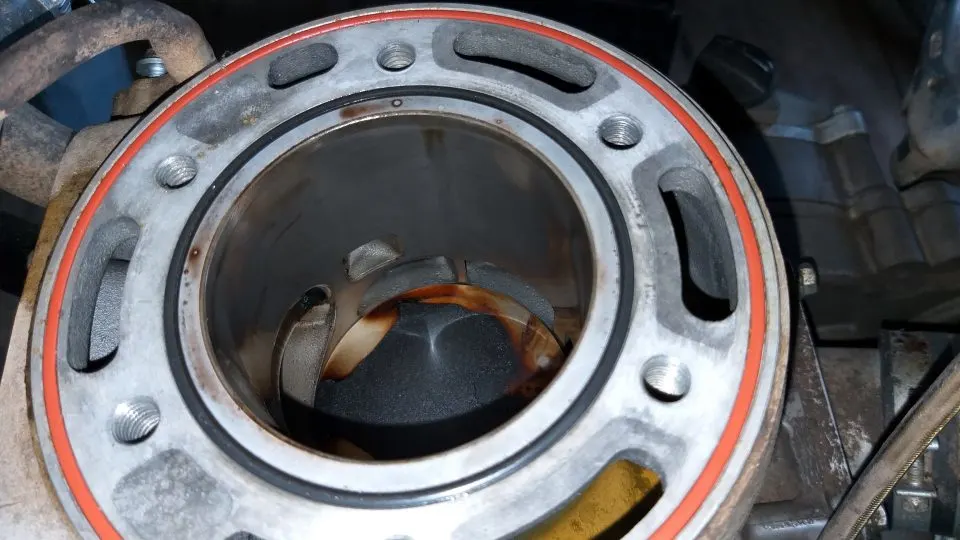
Adjustment
Some 2 stroke engines, such as many KTM dirt bikes, can have the power valve adjusted to open up at a different RPM. Why would you want to change this?
It can change the power curve, making it “hit” harder early in the curve, or smooth out the bottom-end and make it “hit” later in the curve.
How to know if your 2 stroke dirt bike has a power valve or not
The easiest way to tell if your specific 2 stroke dirt bike actually has a power valve is to look at the side of the cylinder. It’s generally
Examples of dirt bike brand power valve systems:
- Kawasaki KIPS
- Honda RC-Valve
- Yamaha YPVS
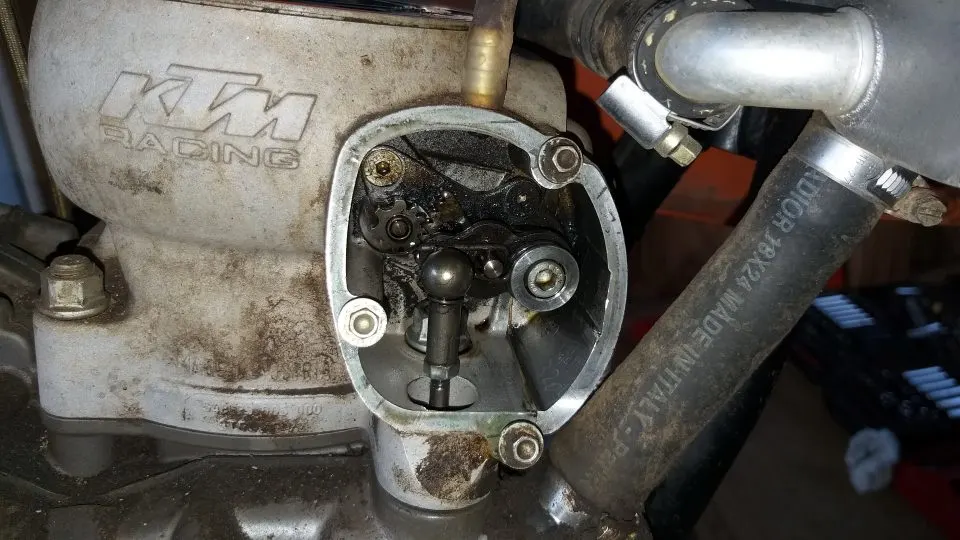
Symptoms
So, what happens when the power valve (or valves) are sticking?
These are the most common signs that the valve is stuck:
Hard to start
If the power valve is stuck open when it should be closed when the engine is off, it could be noticeably more difficult to start, especially when the engine is cold.
Poor throttle response and low-end power
When the power valve is sticking open at a lower rpm, the exhaust velocity is slower because the port is too big, making it feel sluggish and boggy when you try to accelerate.
Lacking top-end horsepower and over rev
Maybe the power valve is stuck closed. In that case, the exhaust port is too small, so there’s not enough flow.
This greatly reduces the power output, making it feel like the engine has about half the power because it won’t “rev out”. There won’t be any “power band” feeling or over rev because it might not even be able to rev that high.
Loud or different exhaust sound
A sticky power valve will cause your bike to sound different and generally louder if it’s stuck open. This is because more air and fuel can flow out the exhaust - it’s acting like the throttle is sticking wide open (100%).
Running rich
A stuck power valve can also creat a rich air-fuel mixture. When it’s blocking exhaust flow, it can’t efficiently evacuate the burned furl mixture, causing some of it to stay in the cylinder.
This will build up into too much fuel for the engine to burn, making it feel sluggish. It will also show up as a black spark plug.
Fouling plugs
If the mixture is too rich or you ride your 2 stroke dirt bike with a power valve that’s sticking for too long it can eventually foul the spark plug. When there’s too much fuel in the combustion chamber for the spark to ignite and combust, it will “soak” the spark plug, causing it to “wet foul”.
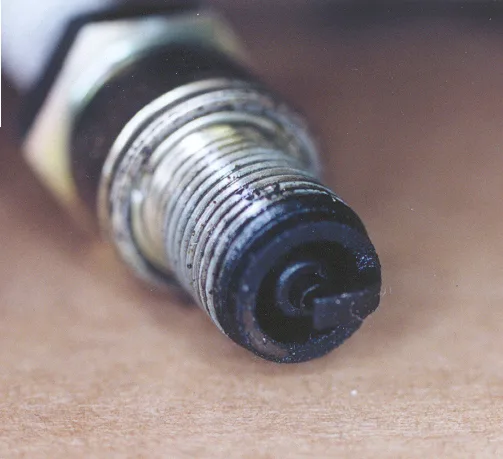
Rattle
A worn or broken power valve can also make a “rattling” noise when the engine is running. If you hear a rattle, you should look into it ASAP - especially if it’s starting to get louder!
How to verify a sticky power valve
Depending on which brand engine you have, there’s usually a window or cover you can remove to verify that the power valve assembly or mechanism is moving.
For example, a Honda CR250 2 stroke, there should be a plug on the left side of the cylinder that you can unscrew. When you start and rev the engine, you should be able to see it move.
Otherwise, you can remove the pipe and look inside the cylinder port to see if it’s sticking.
Stuck open
The power valve can be stuck open due to a mechanical problem or simply because the cylinder and valve is so gummed up with unburnt oil. Either way, you need to figure out what’s causing it or else it could turn into a bigger problem soon.
Maybe something is worn out or simply broke in the assembly. Popping the powervalve cover off to inspect is usually quick and easy - you might have to remove the pipe/expansion chamber to access it easily.
On the other hand, when the engine is poorly tuned, or it has a lot of hours without being “cleaned out”, the power-valve can stick because there’s too much oil or carbon build-up on the valves or cylinder ports.
Problems a sticking power valve can cause
Power loss, poor throttle response and fuel economy are common problems, but there’s a bigger issue if you let it go too long without fixing it.
When a power valve is sticking or if it’s simply worn out, it can eventually touch the piston in severe cases or if there’s too much carbon build-up. Not only will thise cause extreme piston wear, but it can seize the engine if there’s too much contact and friction.
Tuning air-fuel ratio
Since too much fuel going through the engine causes excessive carbon build-up on the piston, cylinder ports and exhaust power-valve, it’s important to get your air and fuel mixture properly tuned.
This primarily comes down to the jetting of the carb, but most people don’t adjust it because they think it’s difficult or that they might blow it up. In reality, you can learn how to start jetting the air screw in just a few minutes if you take it one step at a time.
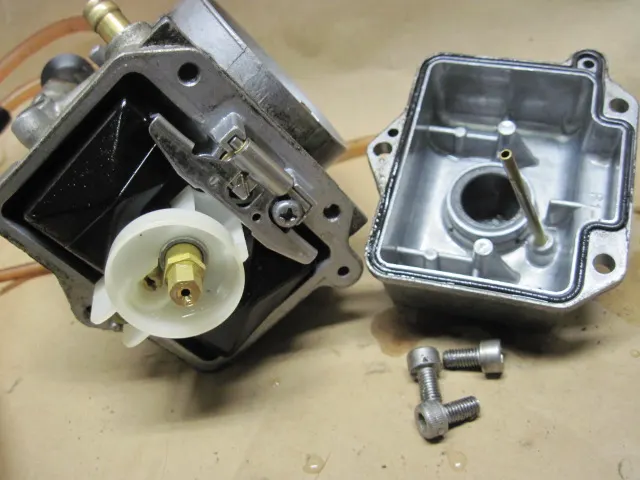
Oil mix ratio to prevent sticking
Another important way to prevent your 2 stroke power valve from sticking is using the proper oil and oil mix ratio based on your specific bike and riding style. This is where a lot of people get it wrong and use too much or too little oil, or simply the wrong kind.
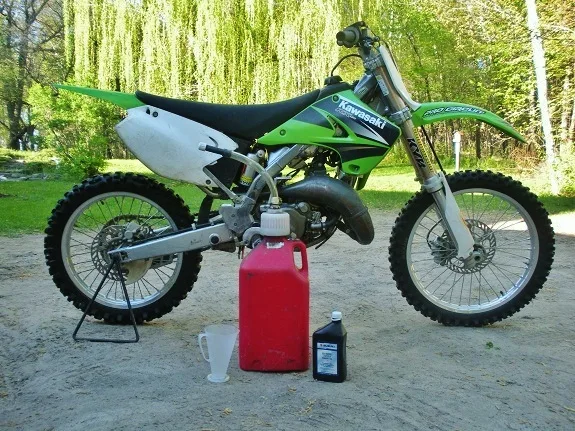
Generally, the bigger your engine displacement, the less oil you need because you’re not revving it as high (less lubrication needed). At the same time, if you’re riding at a lower RPM most of the time, you want a 2 stroke oil that has a lower flashpoint that burns more efficiently so there’s less build-up and smoke.
How to easily prevent a major engine failure
Those are simple ways to make your dirt bike more reliable and last longer, but there are a few more ways that you can prevent a major engine failure. I want to show you how with my FREE guide - click or tap here to download it.

